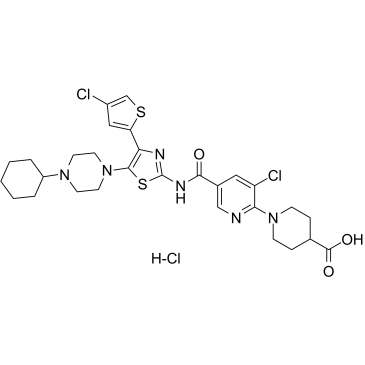Avatrombopag hydrochloride
Modify Date: 2025-08-23 06:26:01

Avatrombopag hydrochloride structure
|
Common Name | Avatrombopag hydrochloride | ||
|---|---|---|---|---|
| CAS Number | 570403-17-7 | Molecular Weight | 686.12 | |
| Density | N/A | Boiling Point | N/A | |
| Molecular Formula | C29H35Cl3N6O3S2 | Melting Point | N/A | |
| MSDS | N/A | Flash Point | N/A | |
Use of Avatrombopag hydrochlorideAvatrombopag (AKR-501) hydrochloride is an orally active, nonpeptide thrombopoietin (TPO) receptor agonist (EC50=3.3 nM). Avatrombopag hydrochloride mimics the biological activities of TPO. Avatrombopag hydrochloride increases platelet production by activating the intracellular signaling system, and promotes production of platelets and megakaryocytes from hemopoietic precursor cells. Avatrombopag hydrochloride is a substrate of cytochrome P450 (CYP) 2C9 and CYP3A[1][2][3]. |
| Name | Avatrombopag hydrochloride |
|---|
| Description | Avatrombopag (AKR-501) hydrochloride is an orally active, nonpeptide thrombopoietin (TPO) receptor agonist (EC50=3.3 nM). Avatrombopag hydrochloride mimics the biological activities of TPO. Avatrombopag hydrochloride increases platelet production by activating the intracellular signaling system, and promotes production of platelets and megakaryocytes from hemopoietic precursor cells. Avatrombopag hydrochloride is a substrate of cytochrome P450 (CYP) 2C9 and CYP3A[1][2][3]. |
|---|---|
| Related Catalog | |
| In Vitro | Avatrombopag (E5501; AKR-501) hydrochloride specifically targets the TPO receptor and stimulated megakaryocytopoiesis throughout the development and maturation of megakaryocytes just as recombinant human TPO (rhTPO) did. Avatrombopag hydrochloride is showed to have effect in humans and chimpanzees only[1]. Avatrombopag hydrochloride (0-100 nM) supports the proliferation of TPO receptor expressing Ba/F3 cell in a concentration-dependent fashion. Avatrombopag hydrochloride (0-3 μM) induces tyrosine phosphorylation of STAT3 and STAT5, and threonine phosphorylation of ERK in the cells, as did rhTPO[1]. Avatrombopag hydrochloride promotes megakaryocyte colony formation from human CB CD34+ cells in a concentration-dependent fashion. The EC50 is 25 nM for Avatrombopag hydrochloride and the maximum activity of Avatrombopag hydrochloride is similar to that of rhTPO[1]. |
| In Vivo | Avatrombopag hydrochloride (0.3-3 mg/kg; p.o.; daily for 14 days) increases the number of human platelets in NOD/SCID mice transplanted with human FL CD34+ cells[1]. Animal Model: NOD/SCID mice (transplanted with human FL CD34+cells)[1] Dosage: 0.3, 1, and 3 mg/kg Administration: P.o.; daily for 14 days Result: Dose-dependently increased the number of human platelets, resulting in approximately a 2.7‐fold increase at 1 mg/kg/d and a 3.0-fold increase at 3 mg/kg/d on day 14 after the start of administration. |
| References |
| Molecular Formula | C29H35Cl3N6O3S2 |
|---|---|
| Molecular Weight | 686.12 |